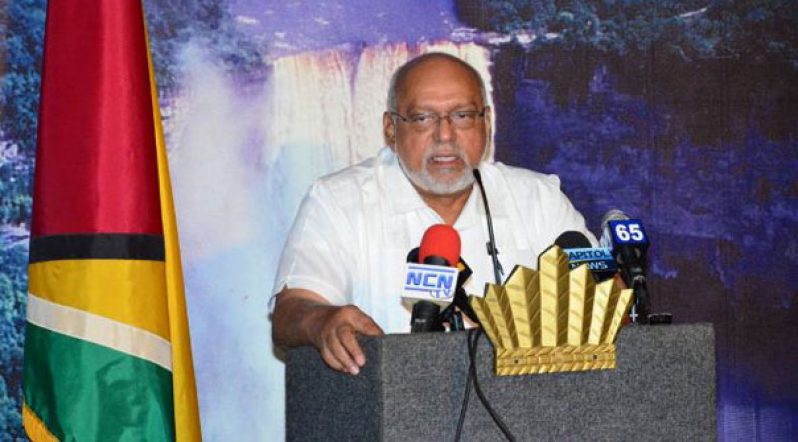LEADER of the Opposition, David Granger, in a statement yesterday emphatically denied that President Donald Ramotar indicated Government was willing to pass the Anti-Money Laundering and Countering the Financing of Terrorism (AML/CFT) (Amendment) Bill, with the party’s amendments – despite the current administration’s contentions that they were non-compliant with international standards.
The statement from A Partnership for National Unity’s (APNU) leader said: “Contrary to recent pronouncements by his Excellency the President Donald Ramotar nothing was offered to the combined opposition.”
Presidential Adviser on Governance, Ms. Gail Teixeira, told the Guyana Chronicle that APNU has essentially “rejected their own” Bill and Granger’s comments that the President “offered nothing” is untrue.

Three versions of two bills are currently before the Committee: the Government’s AML/CFT (Amendment) Bill; APNU’s draft amendments to the Principal AML/CFT Act; and the Attorney-General’s (AG) counter-proposals, which addressed what were seen as problem areas in APNU’s amendment, the latter enjoying 80 per cent agreement, with the exceptions relating to governance and the roles of the President, Government Ministers and the National Assembly within the AML/CFT framework – the only three sticking points.
PRESIDENT’S OFFER

The President and Granger met on Wednesday afternoon and addressed the fact that the AG’s counter-proposals were not fully agreed on, at which point Mr. Ramotar made the offer to have the APNU’s draft amendments to the Principal AML/CFT Act supported, albeit with problematic areas, by the Government.
On Thursday, the President in a statement said: “On Wednesday morning, I called the Leader of the Opposition, and he asked that we meet at 5:00pm on the same day.”
“I met with the Leader of the Opposition on Wednesday June 18, 2014 and I proposed to him that the Government was willing to pass the Bill with the Opposition’s amendments, even though we felt it was non-compliant, and even though we did not agree with it, that we would vote for it so that we can have a Bill before the FATF (Financial Action Task Force) meeting later in June, 2014.
“I also proposed to him that if CFATF (Caribbean Financial Action Task Force) and FATF were to find that the Bill had non-compliant provisions, that the Opposition would support amending the Bill accordingly….the Opposition Leader declined my offer.”
The Head of State bemoaned the rejection by Granger as unfortunate.
He said: “We have worked hard to get the legislation through, because we believe that the consequences could be very serious for our people. We said before that it was a patriotic duty to have this Bill passed, and spare you the Guyanese people the negative consequences of not doing so. Unfortunately, the Opposition seems to have put more importance on its own narrow political, Party agenda before the welfare and interest of our people.”
NO LINKAGES
Additionally, Mr. Ramotar in his offer restated his position that the passage of the AML/CFT Bill must not be linked to any conditionality.
“I also proposed that because of the urgency of the matter, that the Opposition would not link my offer to pass their Bill to their other demands: (1) My assent of all Bills passed by National Assembly; and (2) my support for the Public Procurement Commission being established without Cabinet retaining its role in granting no-objection to awards above $15M (GYD),” the President said on Thursday.
APNU had not only proposed three amendments, which were included in the party’s draft amendments to the Principal AML/CFT Act, but maintains its call for the President to give his assent to several Bills passed in the National Assembly, including the Local Authorities (Elections) (Amendment) Bill 2013, which states that elections must be held on or before August 1, 2014. The Head of State has already forwarded his explanation for his-non assent to the National Assembly.
On the other hand, the AFC, which is fully behind APNU’s position, is demanding the establishment of the Public Procurement Commission (PPC), which the government has agreed to, providing that Cabinet retains its no-objection role in the process; but the latter position has been rejected by the AFC. However, on May 29, after the announcement by CFATF, the AFC, in a statement, noted that it was willing to budge on its position and support Cabinet’s retention of its no-objection role.
TWICE REJECTED
This is the second time the Government’s offer to reach a compromise was rejected.
On Monday, Teixeira, also the Chairperson of the Parliamentary Special Select Committee reviewing the AML/CFT (Amendment) Bill, reported that Government last Friday indicated its willingness to compromise on the three “sticking points” that is holding up agreement on the Bill, but this was rejected by the main Opposition.
“We were rebuffed; we did not have the kind of response from APNU… We tried to have a meeting to reach compromise; something Government was clear that it was willing to do. Unfortunately, it appears that APNU is either not interested or unable to accept our offer,” she said.
Teixeira explained that she went to great lengths to stress the urgency of having a Bill brought to the National Assembly, and pointed out that after the June 11 Select Committee meeting, there was only disagreement on three areas.
“What we have before the Committee is three versions of two Bills: The Government’s AML/CFT (Amendment) Bill; APNU’s draft amendments to the Principal AML/CFT Act; and the AG’s counter-proposals, which addressed the problem areas in APNU’s amendment,” she said.
Guyana is, to date, grappling with regional blacklisting which was implemented by the CFATF last November. It has also been referred to the FATF by the CFATF on May 29 last.
Moreover, it is saddled with a range of onerous measures in its financial dealings with Caribbean countries, which have been advised to safeguard their CFATF-compliant status in their dealings with Guyana. Among those measures are the following: enhancing due diligence measures in their dealings with Guyana; introducing enhanced reporting mechanisms, or systematic reporting of financial transactions; refusing to establish subsidiaries or branches or representative offices in Guyana; and taking into account the fact that financial institutions from Guyana do not have adequate AML/CFT systems, and thus limit the business relationships or financial transactions with this country.
FATF’s next plenary meeting is slated for the period June 23 to 25, 2014 in Paris, France – two days away. The international body is likely to put Guyana up for review by its International Cooperation Review Group (ICRG).
(By Vanessa Narine)



.jpg)








